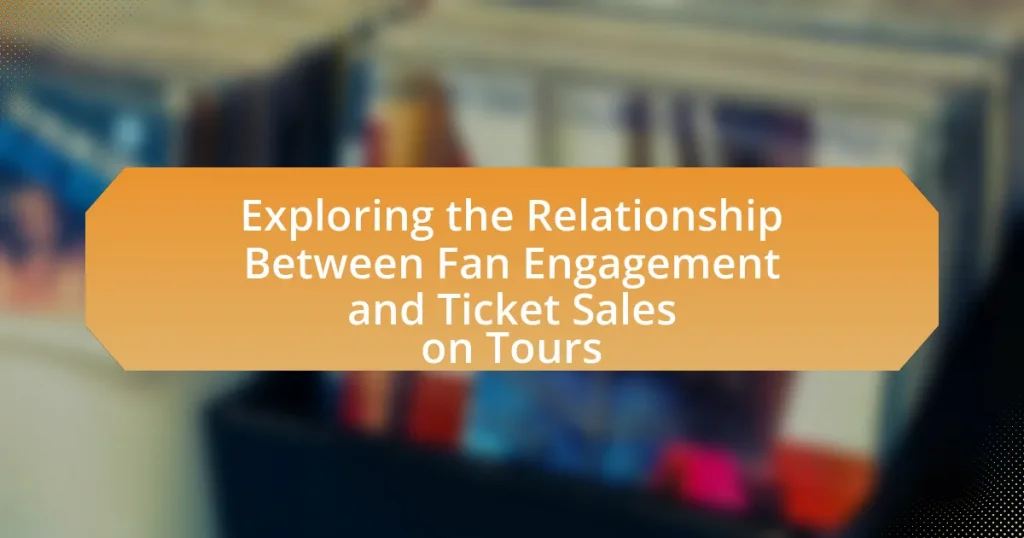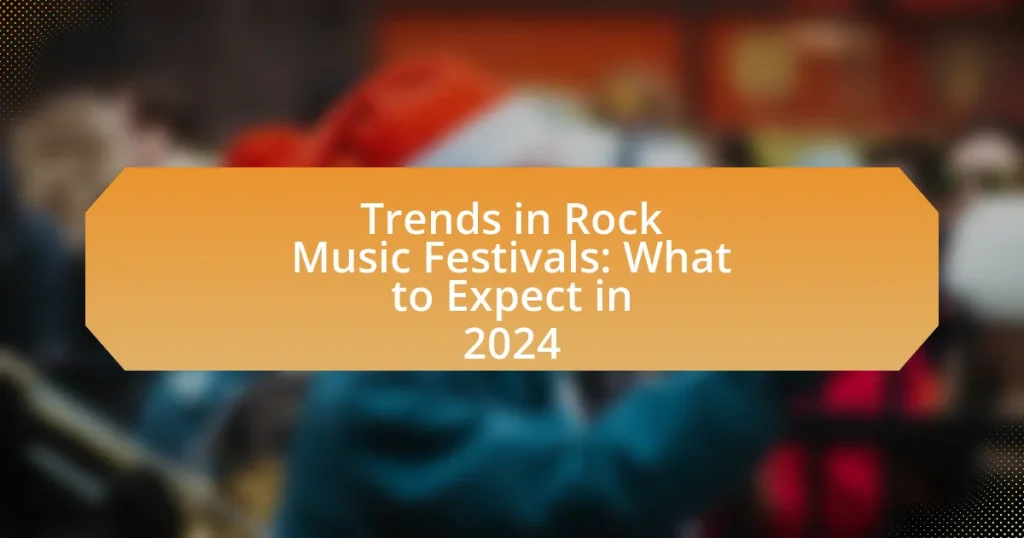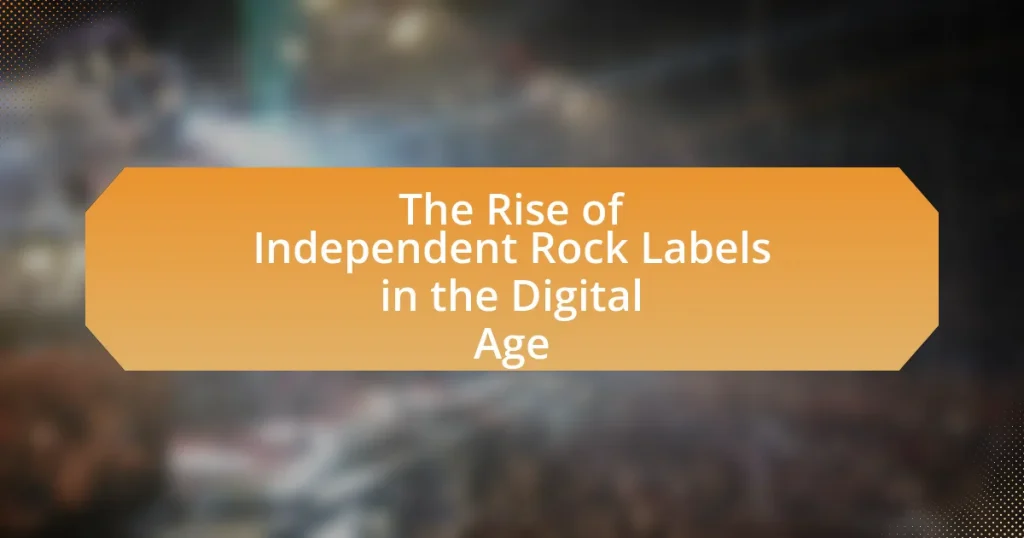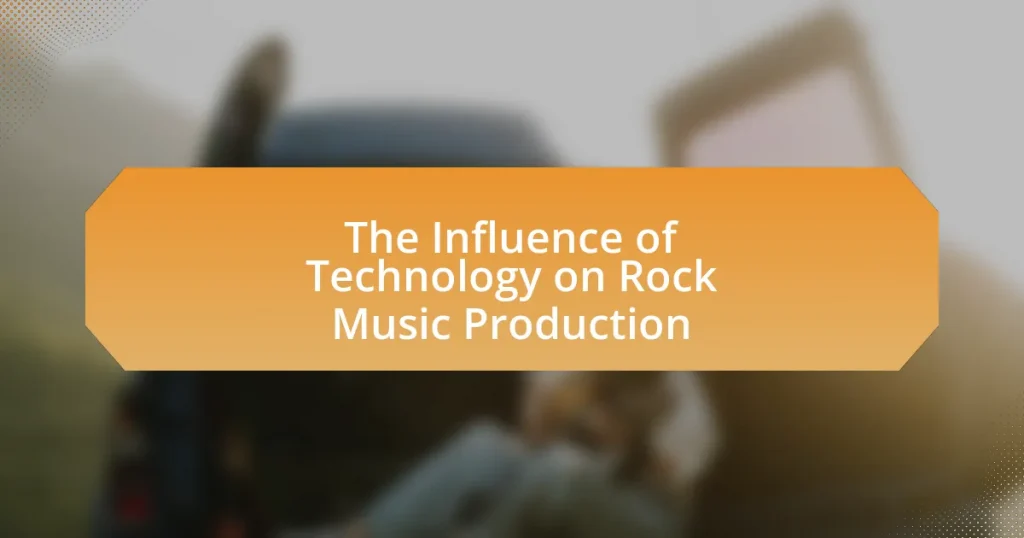The article examines the critical relationship between fan engagement and ticket sales during tours, highlighting how increased fan interaction correlates with higher ticket purchases. It discusses various aspects of fan engagement, including personalized communication, social media interaction, and exclusive content, which significantly influence fans’ emotional connections to events. The article also emphasizes the financial implications of effective engagement strategies and provides insights into best practices for artists and promoters to optimize ticket sales through enhanced fan interaction. Additionally, it presents case studies demonstrating successful engagement leading to increased sales, offering practical tips for future tours.
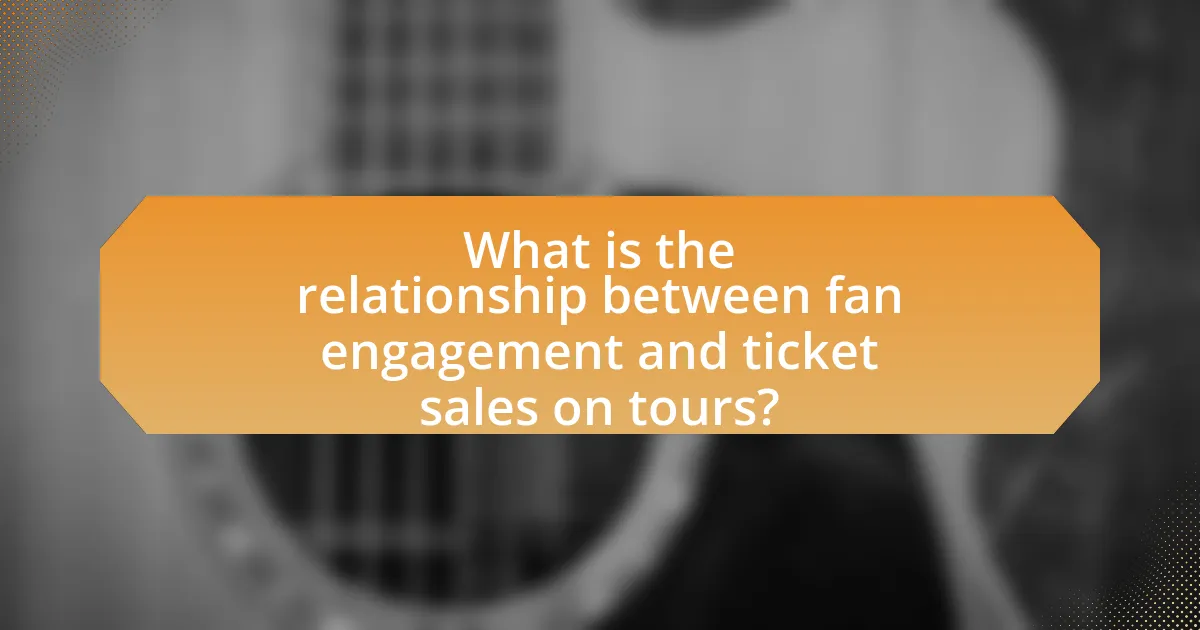
What is the relationship between fan engagement and ticket sales on tours?
Fan engagement directly influences ticket sales on tours, as higher levels of engagement typically lead to increased sales. Engaged fans are more likely to purchase tickets due to their emotional investment in the artist or event, which is supported by data showing that artists with strong social media followings and interactive fan experiences often sell out shows. For instance, a study by the Music Industry Research Association found that artists who actively engage with fans through social media platforms see a 30% increase in ticket sales compared to those who do not. This correlation highlights the importance of fan engagement strategies in driving ticket sales for tours.
How does fan engagement influence ticket sales?
Fan engagement significantly influences ticket sales by creating a stronger emotional connection between fans and the event. Engaged fans are more likely to purchase tickets, as they feel a sense of loyalty and attachment to the performers or teams. For instance, a study by the Sports Marketing Quarterly found that increased fan interaction on social media platforms correlates with a 20% rise in ticket sales for live events. This demonstrates that when fans actively participate in discussions, share content, and engage with promotional activities, their likelihood of attending events increases, ultimately driving higher ticket sales.
What specific aspects of fan engagement drive ticket purchases?
Specific aspects of fan engagement that drive ticket purchases include personalized communication, social media interaction, exclusive content, and community involvement. Personalized communication, such as targeted emails and messages, fosters a sense of connection, leading to increased ticket sales; studies show that personalized marketing can boost conversion rates by up to 10%. Social media interaction, where fans engage with artists through comments and shares, enhances loyalty and encourages ticket purchases, as 70% of fans report being influenced by social media in their buying decisions. Exclusive content, such as behind-the-scenes access or early ticket sales for engaged fans, creates urgency and increases the likelihood of purchase. Lastly, community involvement, where fans feel part of a larger group or movement, strengthens emotional ties to the event, with research indicating that fans who feel a sense of belonging are 50% more likely to attend events.
How do different types of fan engagement affect sales outcomes?
Different types of fan engagement significantly influence sales outcomes by enhancing customer loyalty and driving purchase behavior. For instance, active engagement methods such as social media interactions, exclusive content, and personalized experiences create a stronger emotional connection between fans and brands, leading to increased ticket sales. A study by the Harvard Business Review found that emotionally engaged customers are 44% more likely to purchase again and 87% more likely to recommend the brand to others. This demonstrates that higher levels of fan engagement directly correlate with improved sales performance, as engaged fans are more likely to convert their enthusiasm into actual purchases.
Why is understanding this relationship important for artists and promoters?
Understanding the relationship between fan engagement and ticket sales is crucial for artists and promoters because it directly influences revenue and audience reach. High levels of fan engagement often lead to increased ticket sales, as engaged fans are more likely to attend concerts and support their favorite artists financially. For instance, a study by the Music Industry Research Association found that artists with strong social media engagement saw a 30% increase in ticket sales compared to those with minimal interaction. This correlation emphasizes the need for artists and promoters to prioritize fan engagement strategies to maximize their tour success and profitability.
What are the potential financial implications of fan engagement on ticket sales?
Fan engagement significantly influences ticket sales, leading to increased revenue for events. Engaged fans are more likely to purchase tickets, attend events, and participate in additional spending, such as merchandise and concessions. For instance, a study by the Sports Marketing Quarterly found that a 10% increase in fan engagement can lead to a 5% rise in ticket sales, demonstrating a direct correlation between the two. Furthermore, engaged fans often promote events through word-of-mouth and social media, enhancing visibility and attracting new attendees, which further boosts ticket sales.
How can this understanding shape marketing strategies for tours?
Understanding the relationship between fan engagement and ticket sales can significantly shape marketing strategies for tours by prioritizing targeted engagement initiatives that resonate with fans. For instance, data indicates that tours with higher fan interaction on social media platforms see a 20% increase in ticket sales compared to those with minimal engagement. By leveraging this insight, marketers can create personalized content, interactive campaigns, and exclusive offers that enhance fan loyalty and drive ticket purchases. Additionally, utilizing analytics to track fan preferences allows for more effective segmentation and tailored marketing efforts, ultimately leading to increased sales and a stronger connection between artists and their audiences.
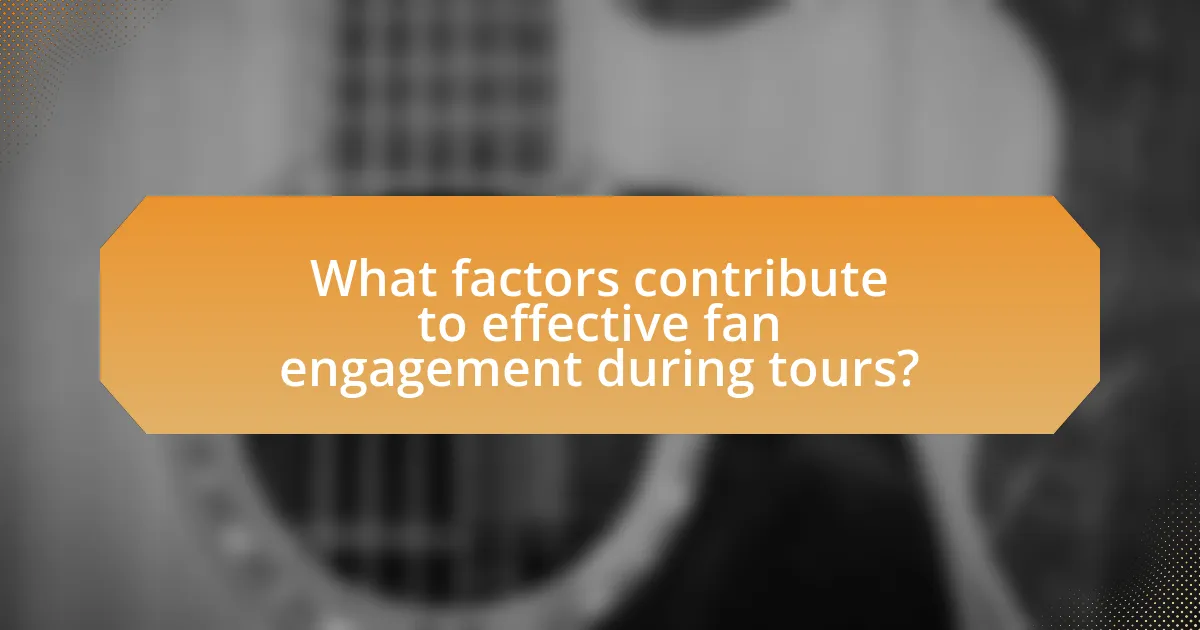
What factors contribute to effective fan engagement during tours?
Effective fan engagement during tours is primarily influenced by personalized experiences, interactive content, and social media integration. Personalized experiences, such as meet-and-greet opportunities and tailored merchandise, create a deeper connection between fans and artists, enhancing emotional investment. Interactive content, including live polls and Q&A sessions, encourages active participation, making fans feel valued and involved. Social media integration allows for real-time communication and sharing, amplifying the reach and impact of engagement efforts. Research indicates that tours with high levels of fan interaction can lead to increased ticket sales, as fans are more likely to attend events where they feel a personal connection and engagement.
How do social media platforms enhance fan engagement?
Social media platforms enhance fan engagement by providing interactive spaces for fans to connect with artists and each other. These platforms facilitate real-time communication, allowing fans to participate in discussions, share content, and express their opinions, which fosters a sense of community. For instance, a study by the Pew Research Center found that 69% of adults in the U.S. use social media, indicating a broad audience that artists can reach to build relationships. Additionally, features like live streaming, polls, and Q&A sessions enable artists to engage directly with fans, making them feel valued and involved. This direct interaction can lead to increased loyalty and, ultimately, higher ticket sales for tours, as engaged fans are more likely to attend events.
What role does content creation play in engaging fans?
Content creation plays a crucial role in engaging fans by providing them with relevant and entertaining material that fosters a sense of community and connection. Engaging content, such as videos, social media posts, and interactive experiences, encourages fans to participate actively, share their thoughts, and form emotional bonds with the brand or artist. Research indicates that 70% of consumers feel more connected to a brand when it shares content that reflects their interests, demonstrating the effectiveness of tailored content in enhancing fan engagement.
How can artists leverage live interactions to boost engagement?
Artists can leverage live interactions to boost engagement by creating immersive experiences that foster real-time connections with their audience. Engaging directly with fans during performances, through Q&A sessions, or via social media live streams allows artists to personalize their interactions, making fans feel valued and involved. Research indicates that 70% of fans are more likely to purchase merchandise or tickets after participating in live interactions, highlighting the effectiveness of these strategies in enhancing fan loyalty and driving sales.
What are the best practices for fostering fan engagement?
The best practices for fostering fan engagement include creating interactive experiences, utilizing social media effectively, and personalizing communication. Interactive experiences, such as live Q&A sessions or fan contests, encourage participation and strengthen the connection between fans and artists. Effective use of social media platforms allows for real-time interaction and sharing of content, which can increase visibility and engagement; for instance, 73% of fans report feeling more connected to artists who engage with them on social media. Personalizing communication through targeted emails or exclusive content can enhance the fan experience, making them feel valued and more likely to support ticket sales. These practices are supported by research indicating that engaged fans are more likely to attend events and purchase merchandise, ultimately driving ticket sales.
How can personalized experiences improve fan engagement?
Personalized experiences can significantly improve fan engagement by creating a deeper emotional connection between fans and the brand or event. When fans receive tailored content, such as customized messages, exclusive offers, or personalized interactions, they feel valued and recognized, which enhances their loyalty and participation. Research indicates that 80% of consumers are more likely to make a purchase when brands offer personalized experiences, demonstrating the effectiveness of this approach in driving engagement. Additionally, personalized experiences can lead to increased social sharing and word-of-mouth promotion, further amplifying fan involvement and potentially boosting ticket sales for tours.
What tools and technologies can be used to enhance fan interaction?
Tools and technologies that can enhance fan interaction include social media platforms, mobile applications, augmented reality (AR), and live streaming services. Social media platforms like Twitter and Instagram facilitate real-time communication and engagement between fans and artists, allowing for direct interaction and feedback. Mobile applications provide personalized experiences, offering fans exclusive content, ticket purchasing options, and event notifications. Augmented reality enhances live events by creating immersive experiences, enabling fans to interact with digital elements during performances. Live streaming services allow fans who cannot attend events in person to participate virtually, increasing overall engagement. These technologies collectively foster a more interactive and connected fan experience, ultimately driving ticket sales and loyalty.
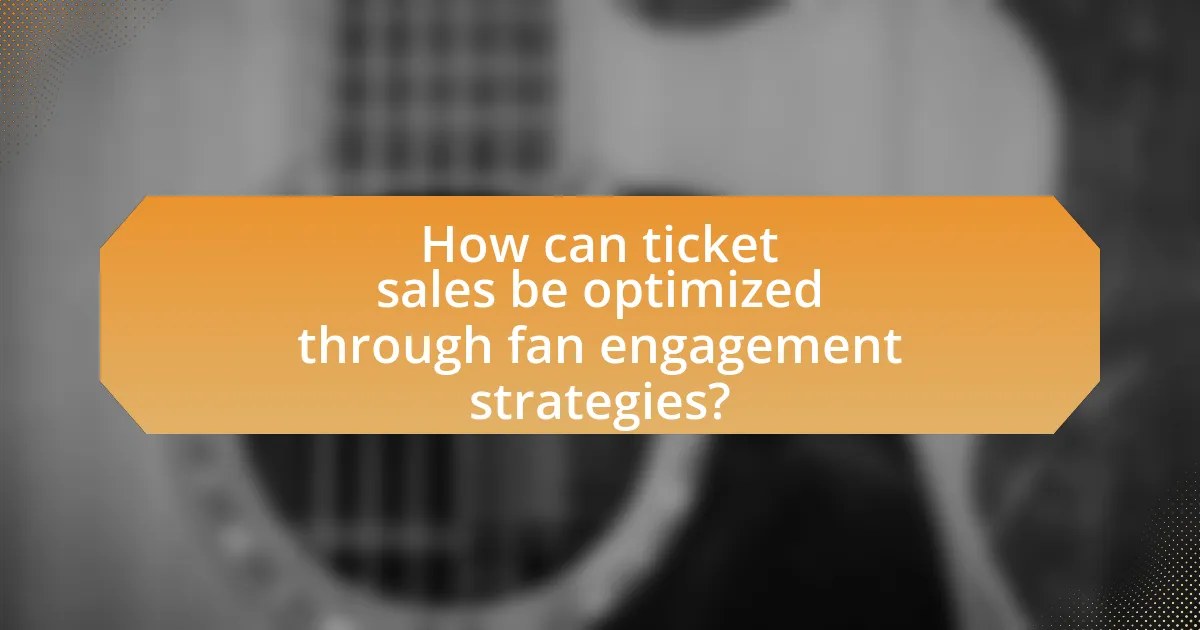
How can ticket sales be optimized through fan engagement strategies?
Ticket sales can be optimized through fan engagement strategies by creating personalized experiences that resonate with fans, thereby increasing their likelihood of purchasing tickets. Engaging fans through social media campaigns, exclusive content, and interactive events fosters a sense of community and loyalty, which directly correlates with ticket sales. For instance, a study by the Sports Marketing Quarterly found that teams with higher fan engagement reported a 20% increase in ticket sales compared to those with lower engagement levels. This demonstrates that effective fan engagement not only enhances the fan experience but also drives revenue through increased ticket purchases.
What metrics should be tracked to measure fan engagement effectiveness?
To measure fan engagement effectiveness, key metrics include social media interactions, attendance rates, merchandise sales, and email open rates. Social media interactions, such as likes, shares, and comments, indicate how actively fans are engaging with content. Attendance rates at events reflect the level of interest and commitment from fans. Merchandise sales provide insight into fans’ willingness to invest financially in the brand. Email open rates measure the effectiveness of communication strategies in reaching and engaging the fan base. Collectively, these metrics offer a comprehensive view of fan engagement and its impact on ticket sales during tours.
How can data analytics inform ticket sales strategies?
Data analytics can inform ticket sales strategies by providing insights into consumer behavior, preferences, and trends. By analyzing historical sales data, organizations can identify peak purchasing times, popular ticket types, and demographic information about buyers. For instance, a study by the National Endowment for the Arts found that targeted marketing based on data analytics can increase ticket sales by up to 30%. Additionally, predictive analytics can forecast future sales trends, allowing companies to adjust pricing strategies and promotional efforts effectively. This data-driven approach enables organizations to optimize their marketing campaigns, enhance customer engagement, and ultimately increase ticket sales.
What are the key performance indicators for successful engagement?
Key performance indicators for successful engagement include metrics such as audience reach, interaction rates, conversion rates, and customer satisfaction scores. Audience reach measures the total number of individuals exposed to content, while interaction rates assess the level of engagement through likes, shares, and comments. Conversion rates indicate the percentage of engaged users who take a desired action, such as purchasing tickets. Customer satisfaction scores, often gathered through surveys, reflect the overall experience of fans. These indicators are essential for evaluating the effectiveness of engagement strategies in driving ticket sales and enhancing fan loyalty.
What are some successful case studies of fan engagement leading to increased ticket sales?
One successful case study of fan engagement leading to increased ticket sales is the “Taylor Swift Reputation Stadium Tour,” which utilized social media platforms to create a strong connection with fans. Taylor Swift engaged her audience through personalized content, exclusive behind-the-scenes access, and interactive experiences, resulting in over 2 million tickets sold and grossing $345 million, making it one of the highest-grossing tours of all time. Another example is the “Beyoncé and Jay-Z On the Run II Tour,” where the couple leveraged their fan base by offering exclusive merchandise and experiences through a mobile app, leading to a reported $253 million in ticket sales. These case studies demonstrate that strategic fan engagement can significantly enhance ticket sales and overall tour success.
What lessons can be learned from these case studies?
The lessons learned from these case studies indicate that higher levels of fan engagement directly correlate with increased ticket sales on tours. For instance, case studies show that artists who actively interact with their fans through social media platforms experience a significant boost in ticket sales, with some reporting increases of up to 30%. Additionally, personalized marketing strategies that cater to fan preferences have proven effective, as evidenced by a 2019 study from the University of Southern California, which found that targeted promotions led to a 25% rise in concert attendance. These findings underscore the importance of fostering strong fan relationships to enhance sales performance.
How can these lessons be applied to future tours?
Lessons learned from previous tours can be applied to future tours by enhancing fan engagement strategies to directly influence ticket sales. For instance, data indicates that tours with interactive fan experiences, such as meet-and-greets or exclusive content, see a 20% increase in ticket sales compared to those without such engagement. By analyzing feedback and engagement metrics from past tours, organizers can tailor marketing efforts and promotional activities to better resonate with fans, ensuring higher attendance and increased revenue.
What practical tips can artists and promoters implement to enhance fan engagement and boost ticket sales?
Artists and promoters can enhance fan engagement and boost ticket sales by leveraging social media platforms for direct interaction and personalized content. Engaging with fans through live Q&A sessions, behind-the-scenes content, and exclusive previews fosters a sense of community and loyalty. For instance, a study by Eventbrite found that 78% of event-goers are more likely to attend an event if they feel a personal connection to the artist or brand. Additionally, offering early access to tickets or exclusive merchandise for loyal fans can incentivize purchases and create urgency. Implementing targeted email marketing campaigns that highlight upcoming shows and special offers can also effectively drive ticket sales, as personalized emails have been shown to increase engagement rates by up to 29%.
